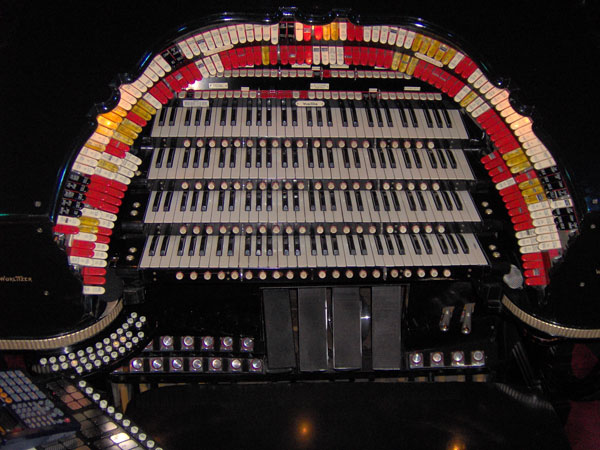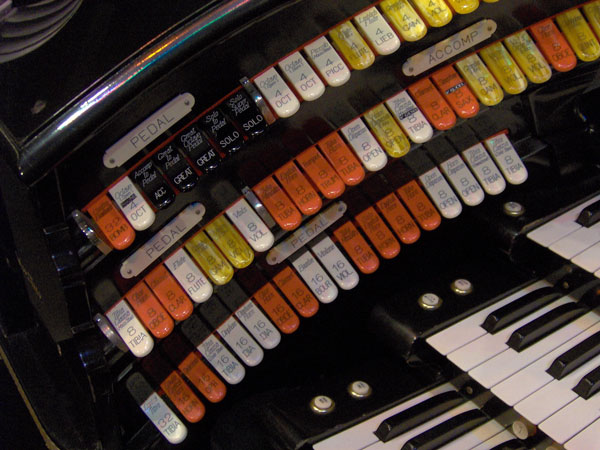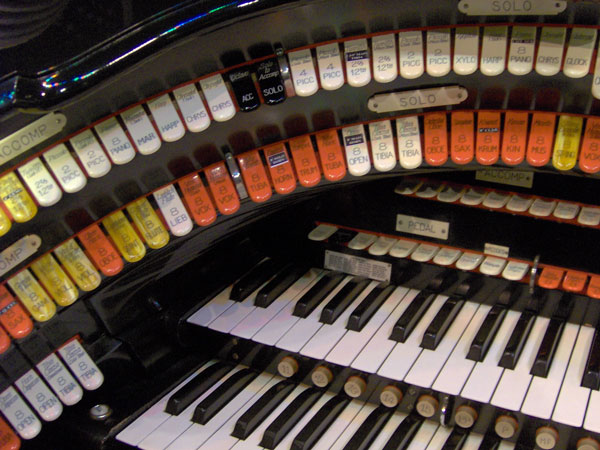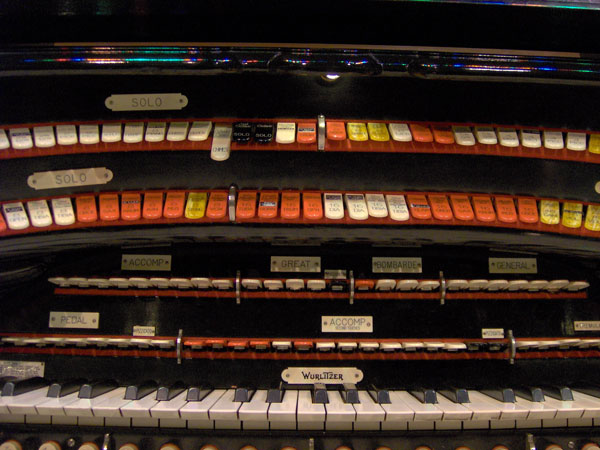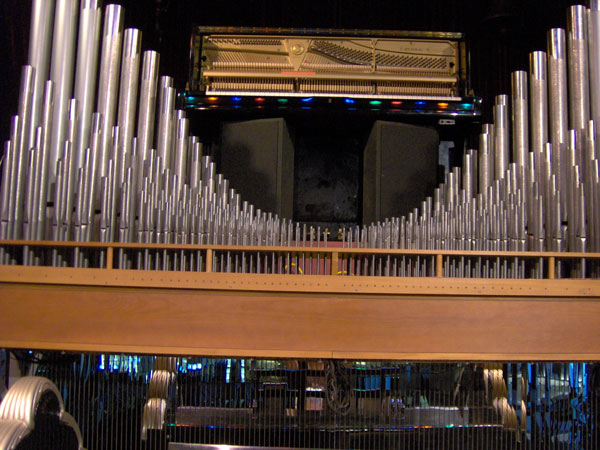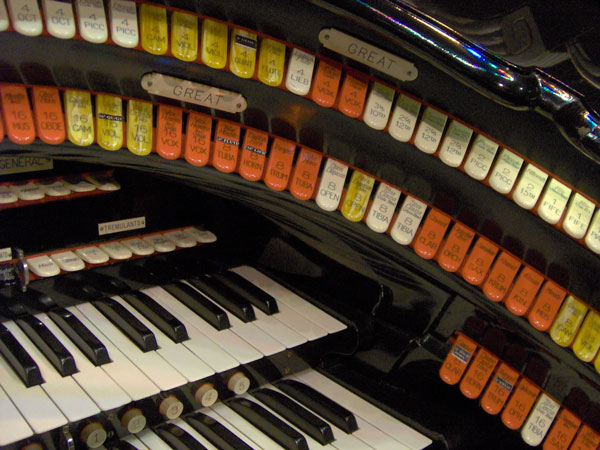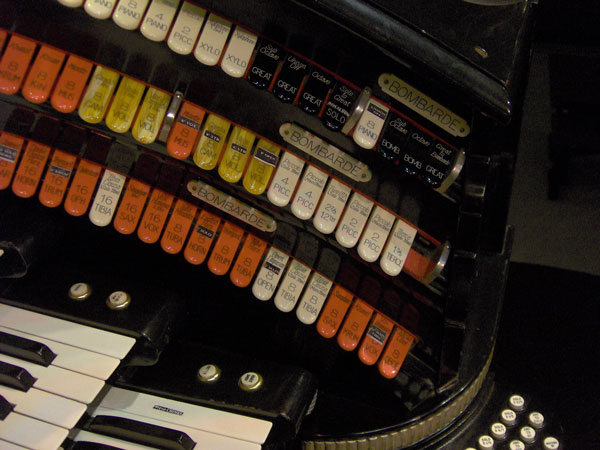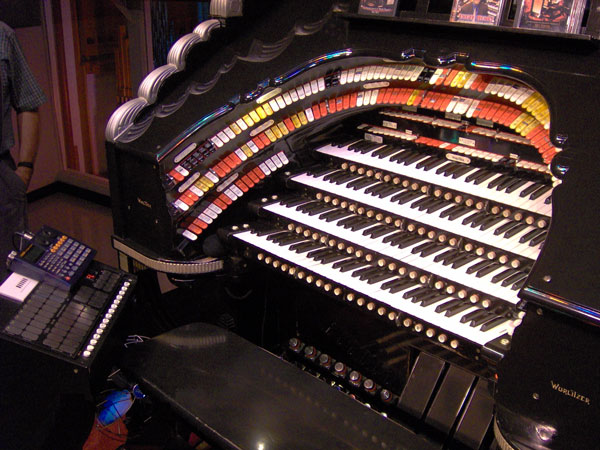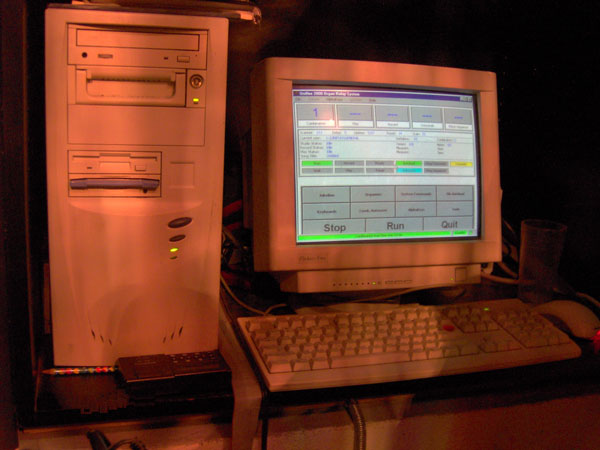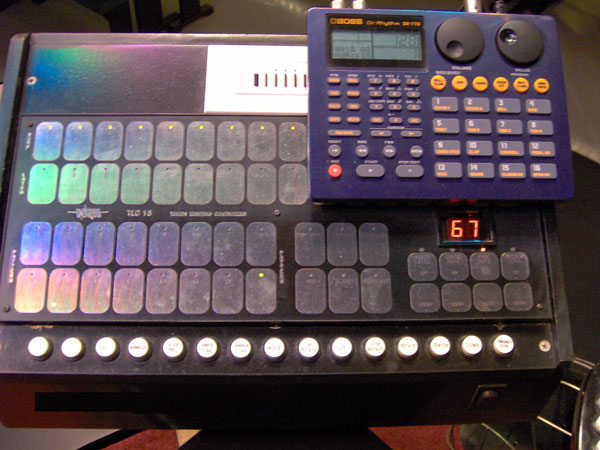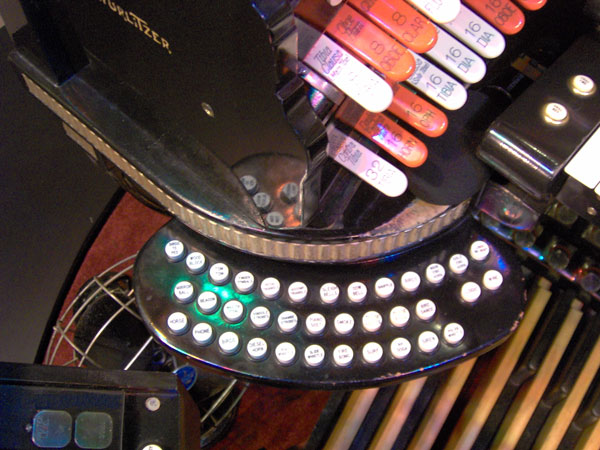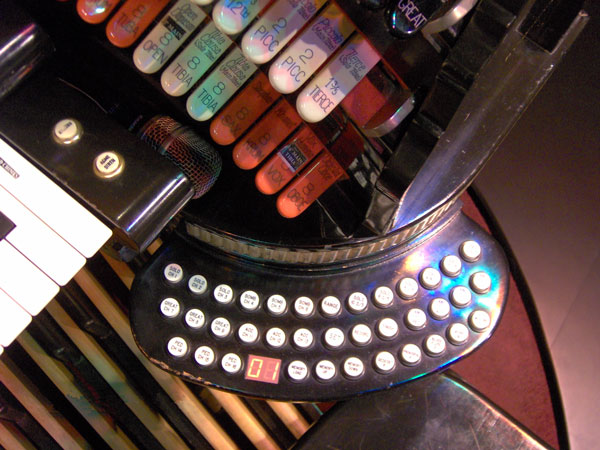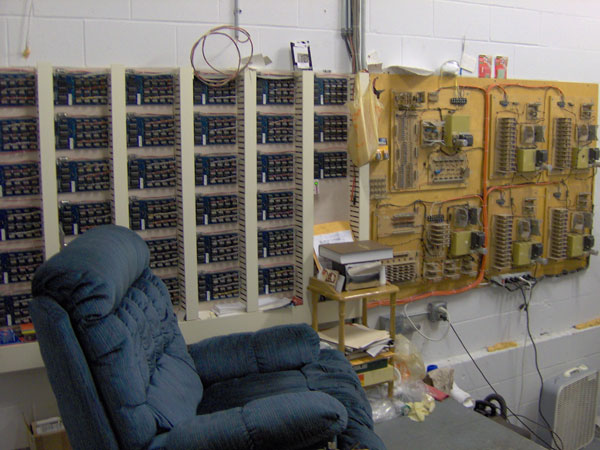
|
|
|
On the west coast of Florida, fourty-five miles south of Tampa, is to be found one of the most unique dining establishments in the entire United States of America. This is Roaring 20's Pizza and Pipes, home of Black Beauty, a massive 4/42 Mighty WurliTzer Theatre Pipe Organ.
This huge Theatre Pipe Organ is lovingly maintained, and entertains up to 450 visitors at a time during the open season, who travel for many miles around to hear the music it makes and enjoy the delicious food and beverages served during the show, featuring world famous organists Bill Vlasic and Dwight Thomas. 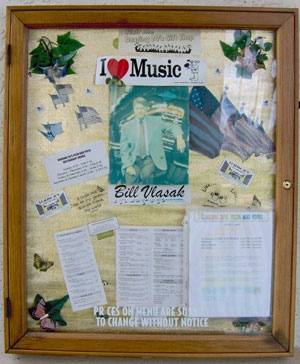 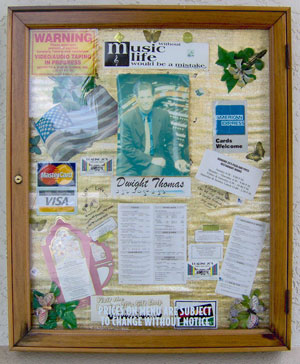
These neat wood-framed collages flank the main entrance to Roaring Twenties 20's and Pipes. One the left side of the large stained glass front door can be found memorabilia from Bill Vlasac. To the right, we find memorabilia from Dwight Thomas. If you would like to know more, visit the Roaring 20's Pizza and Pipes website or call Bill Vlasic at 1(941)723-1733. You can fax in an order by dialing 1(941)723-3603. Evening performances are held from 5:00 PM to 9:00 PM Monday through Thursday, 5:00 PM to 10:00 PM Friday and Saturday, and 5:00 PM to 9:00 PM on Sunday. Bookings for parties and special events are always welcome. A good look at Black BeautyThe Featured Organ of the Month for August, 2005 is the4/42 Mighty WurliTzer Theatre Pipe Organ. Those who affectionately care for and play this fine instrument refer to her as "Black Beauty" because of the polyurethane finished jet black console.
Here, we see the left side of the stop sweep where the Pedal voices are found. The 32' stops are resultants. This organ has two 32' stops in the Pedal, one being a Tibia and the other a Reed. A really neat feature the organ has is this: the badges containing the labels for the manuals and pedals are actually cancel switches that, when pushed, cause all the stops for that section to instantly return to the "Off" position.
Here, we see the first turn of the stop sweep in the left side of the horseshoe where the Accompaniment and some of the Solo stops are found. The stop tongues that have small black overlay labels with white lettering on them have been remapped to other ranks.
Here, we see more of the Solo stops above the back rail of the stop sweep where the Second Touch voices and the Tremulants are found. The Second Touch voices are controlled by the Accompaniment manual, the lowermost or first keyboard in the console. There are a large selection of Second Touch voices to choose from and each section of the instrument has its own Tremulant.
Here, we see the upright piano and the unenclosed classical rank mounted on a riser above and behind the console at stage level. The piano is mic'ed and plays back through the two loudspeakers sitting in front of it.
Here, we see the second turn of the stop sweep containing some of the Great and most of the Solo stops. Once again, notice the small black overlay labels with white lettering on them where yet even more stops have been remapped to other ranks.
Here, we see the right side of the stop sweep where the Bombarde voices are found. The Bombarde is the third manual in the console. This organ has four 61-note manuals, of which one has Second Touch, that one being the Accompaniment. The Second Touch on this console is extremely sensative, requiring just a slight increase in key pressure to activate. This makes the organ easy to play, producing very complex stop changes on the fly. A bit of history...The 4/42 Mighty WurliTzer Theatre Pipe Organ installed at Roaring 20's Pizza and Pipes has lead a colorful existence since it was originaly delivered in 1931 to the Paramount Theatre in Oakland, California. This organ was one of seventeen such instruments built for the Publix chain of movie houses. The lovely Art Deco console style is known as "Publix 1". This particular console is a varient of the Art Deco style, called a Waterfall console.
Here, we see the gorgeous console of the 4/42 Mighty WurliTzer Theatre Pipe Organ. It is original, although Ken Crome did refinish it in 1960, changing the finish from the original gold paint with gold leaf to the present black polyurethane with gold, silver and copper leaf. In 1978, Ken revisited the instrument and every part of the organ was completely rebuilt. The project saw a total redesign, and the pipe count was increased from the original twenty ranks to fourty-two. Today, the instrument contains 3,000 pipes ranging in size from large wooden diaphones that are sixteen feet tall to small metal flues the size of a pencil. Special Features of Black BeautyBlack Beauty has several features that not only make her extremely versatile, but very easy to play and maintain. There are many features that are unique to this incredible installation.
Here, we see the custom built computer that controls the electronics that make up Black Beauty's circuitry. This machine can store stop lists and performance data that are recallable from the console at any time. This computer was built by Tim Rickman and is known as a Uniflex 2000. An artist can play the organ and everything that happens can be written to a file for later recall, allowing the organ to "play itself". Also, any stop tongue can control any rank at will. With this computer, Black Beauty is truly a modern Theatre Pipe Organ for the twenty-first century and beyond!
Here, we see the special lighting control board next to the console of the organ. This allows the organist to select any of the many lights in the building and control them manually or assign them to stops or song selections to be switched on or off as the performance takes place. This board is connected to the organ console computer so that settings can be stored for later recall at any time. Mounted in the upper right corner of this board is the Boss Dr. Rhythm unit that controls the drums and traps for the ultimate drum machine using real mechanical devices triggered by MIDI signals. This way, there can be a "live drummer" sitting in at all times.
Here, we see the left swingout that controls the tuned percussions and other features of the 4/42 Mighty WurliTzer Theatre Pipe Organ. This panel is under the left bolster endblock, below the Accompaniment manual. Here, we see the right swingout in the console of the 4/42 Mighty WurliTzer Theatre Pipe Organ. This panel is under the right bolster endblock, below the Accompaniment manual. Here, the Combination Action memory levels are programmed and recalled. Mounted on the wall in a room between the two pipe chambers is the computerized relay controlling the huge organ. The leftmost panels contain the switching stacks for the wind driven ranks. The rightmost panels are the digital extentions consisting of bass voices and special effects not provided by mechanical devices. To the right of this maze of electronics is the door that leads into the pit where the console rests when not in use or when the computer is being programmed between shows. The organist enters this pit and hits a switch that raises the console up to stage level on a scissor lift with a turntable that allows the console to be rotated 180 degrees. When the organist plays, his back is to the audience as he faces the chambers containing the 3,000 pipes. The Main chamber is to the left and the Solo chamber is to the right of the stage. Roaring 20's Recordings On CDAs we get more information about this fine instrument and process more pictures, we will post this content for you to enjoy. During our recent trip to the restaurant, we took over 100 pictures and talked at length to the owners of this unique establishment. We are planning many more return visits to Roaring 20's Pizza and Pipes to play the organ and sample the fine food served there. There have been many records produced on Black Beauty. Her players, Bill Vlasak and Dwight Thomas, also work with othe famous Theatre Pipe Organs. Below are four selections from these talented musicians. Just click on a cover shot to buy that item. Be sure to collect them all! |
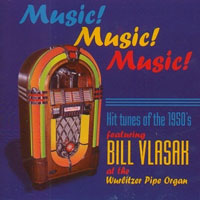 |
 |
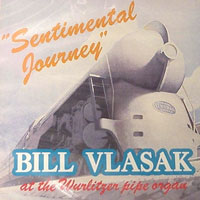 |
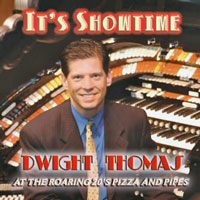 |

